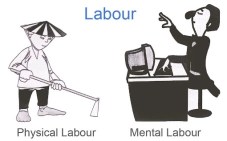10 Characteristics of Labour are listed and explained in this article and we hope you find it informative and able to meet your research demands.
10 Characteristics of Labour

Read Also: Characteristics of Capital
Labour as a factor of production has to do with all forms of efforts that humans put into or exert in making production successful.
This effort can either be a physical, mental, or psychological effort that is generated in the production process. For production to take place within a company, great effort has to be put in by humans in collaboration with other favors of production and the synergy brings to birth great products and quality service delivery.
Characteristics of Labour
Read Also: Types and Importance of Capital
Below are the Characteristics of Labour:
1. Labour is mobile
A laborer can easily move from one place to another whole on the job and at the same time, the same laborer can as well move from one job to another, hence it cannot be relied upon.
2. Labour has feelings
Labour cannot be deployed anyhow because it has feelings and its feelings could be tempered if not consented to before being used in an area of production hence, its consent must be sorted before it is used in the process of production.
3. Labour is skillful
Labor becomes skillful through education at higher institutions as well as on-the-job or off-the-job training. Its skillfulness, however, is dependent on information either practically or theoretically.
Read Also: Causes of Low Capital Formation and Accumulation in West African countries
4. Labour can be controlled
Because labor is a human factor, it can be controlled in terms of its supply. An entrepreneur can decide how much CH labor he or she needs to make production a success.
5. Labour requires motivation
In order to foster optimal performance, and efficient service delivery as well as increase productivity, labor has to be motivated in one way or the other from time to time.
6. Labour is not predictable
Quite unlike other factors of production which may be predictable, labor is quite unpredictable because it is human and subject to change at any time.
Read Also: Functions of National Economic Reconstruction Fund
7. Labour is not fixed
How much and quality of labor a company has is never fixed because labor is variable, it is, not in any way fixed because it varies both in quantity and quality.
8. Labour is Perishable
Labour is a perishable factor of production because what a person knows about a job can be forgotten or lost either in the case of trauma, unemployment, underemployment, age, or even death.
9. Labour controls all other factors of production
It is in the nature of labor to dominate all other factors of production and look for possible ways to maximize the profit from them all, thus, labor controls all other factors of production and makes them more and more meaningful to society.
Read Also: Importance of Agriculture
10. Labour has initiative
It can act on its own, it does not necessarily await instructions from superiors all the time, labor can get things done with or without a command because labor knows the right thing to do at the time especially if he is a skilled laborer and even in most cases, unskilled labor who has been on the job for a long time can equally get the initiative to get things done based on experience.
Now, that you know about what makes labor, please feel free to share.